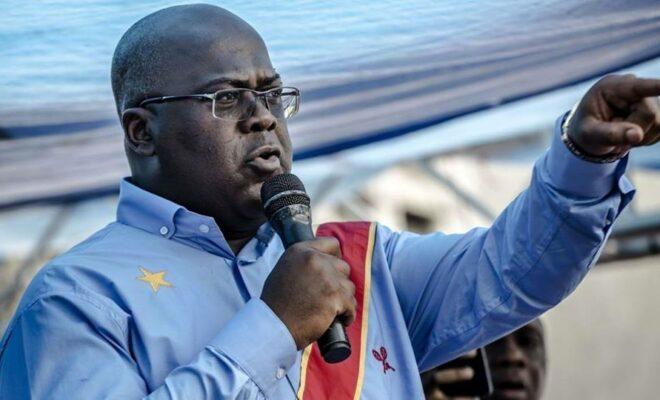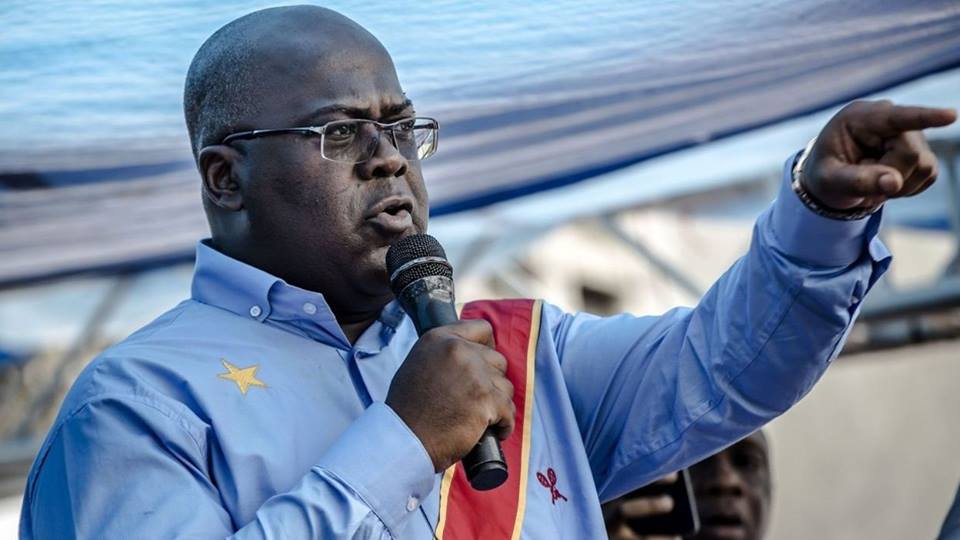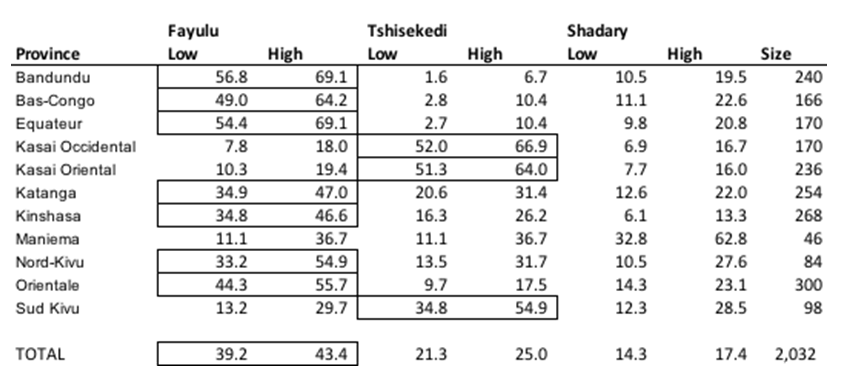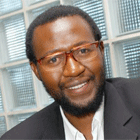Congo’s 2018 elections: An analysis of implausible results

What are the chances that Felix Tshisekedi really won?

Opposition candidate Felix Tshisekedi was announced the surprise winner of the DRC’s presidential election. Credit: UDPS.
Early this morning, the National Independent Electoral Commission (CENI) finally announced official but provisional results from the Democratic Republic of Congo’s presidential elections held on 30 December 2018. Against all available independent evidence, CENI announced Felix Tshisekedi of the opposition Union pour la Démocratie et le Progrès Social (UDPS) as the winner with 38.5%. Martin Fayulu, of the Lamuka opposition alliance, was said to have obtained 34.7% of the votes. The regime’s candidate, Emmanuel Ramazani Shadary, garnered 23.8%. The participation rate was 47.6%.
While rumors of a possible Tshisekedi victory had been swirling around the capital Kinshasa over the last few days – fed in part by alleged negotiations between his camp and the regime as well as the candidate’s recent benevolent declarations towards the outgoing President Joseph Kabila – the results are nonetheless highly implausible. Broadly reliable polling data by Congo’s BERCI and France’s IPSOS for the Congo Research Group (CRG) in December and actual voting count data by some 40,000 observers from the Catholic Episcopal Commission (CENCO) point instead to a solid and statistically robust victory by Fayulu.
As a matter of fact, and as explained in detail below, CRG’s data suggests that the probability Tshisekedi could have scored 38% in a free election is less than 0.0000. There is a 95% chance his real numbers would be somewhere between 21.3% and 25%.
Even if we include all the people who intended to vote for his ally Vital Kamerhe and attribute all the non-responses in the polls (the 10% who replied “don’t know,” “refuse to answer,” etc.) to Tshisekedi, his 95%-confidence interval would rise to 31.5%-35.6%. There would still be a virtually zero chance he would have got 38.5%.
By that same token, the polls suggest Fayulu would have obtained between 39% and 43% (not 34.7%) of the vote, and Shadary between 14% and 17.4% (not 23.8%). How are these very large discrepancies possible? I review some possible explanations below. But first I revisit the polling data to make sure it is reliable.
Assessing the polls
I obtained the polling data from CRG Director Jason Stearns. In order to reduce margins of error, I pooled the data from both polls into one data set, which totals 2,032 observations. My estimates differ from those published by CRG because some data was missing from the IPSOS file I received and I did not remove the non-answers from the sample. As mentioned above, I addressed the non-answer problems by imputing them all to Tshisekedi. The missing data came mostly from Maniema and, less so, the Kivus. In the poll, Maniema leaned strongly in favor of Shadary, whose home province it is, and South Kivu to Tshisekedi (thanks to his ally Kamerhe who is from there). As a result, greater sample sizes in these provinces would have been unlikely to benefit these two contenders.
CENI has not so far released results by provinces, but presenting the polling data along provincial lines helps make sense of the findings. I use the 11 old provinces (some of which were broken up into smaller units in 2015) in order to have large enough sample sizes.
As the table below shows, the results by province leave little room for ambiguity. Fayulu had a statistically significant lead in seven of them (marked in the table by a box). Tshisekedi had a similar lead in both Kasai provinces and in South Kivu thanks to Kamerhe (who can expect to be rewarded). Shadary had a non-significant lead in Maniema.

But were these polls truly representative? Kabila allies suggested that predictions of a Fayulu victory neglected rural areas where the regime is more popular. However, I did not find any evidence of such a sampling bias. In fact, the joint proportion of urban respondents in both surveys was 41.75%, which is less than Congo’s urbanisation rate of 43.9% according to the World Bank. This suggests that, if anything, rural residents were oversampled.
Despite the relative under-representation of Maniema and both Kivus in the data, the provincial sample sizes still correlated at 0.87 with the CENI figures for registered voters, suggesting the overall representativeness of the results at the national level.
Could BERCI, IPSOS or the CRG have cheated? Some have suggested that BERCI Director Francesca Bomboko is a close friend to Olivier Kamitatu, who used to run BERCI with her and is now opposition figure Moïse Katumbi’s chief-of-staff. Others have pointed out that Stearns is a long-standing critique of the regime, who was expelled from Kinshasa a couple of year ago. Though this may be true, I very much doubt they could have led to fraud. BERCI has a long-established reputation as an independent polling institute and the closeness of its results with those of IPSOS offers prima facie evidence of their validity. Meanwhile, Stearns’ scholarship on Congo has stood out for years for its rigour and independence.
How do we make sense of the results?
All in all, it is the Congolese regime that had the greatest incentives to cheat. And there are many indications it did so. I will not focus here on the well-documented repression of the Congolese opposition and the obstacles put in the path of Fayulu’s campaign here; the many instances of dubious practices by CENI and its staff might have been enough to sway the results.
First, there was the suspension of the voting in various places. The election was postponed in Beni territory, Beni town and Lubero territory (all in North Kivu) for Ebola reasons. And it was delayed in Yumbi territory in Mai-Ndombe (ex-Bandundu) province because of intercommunal violence. Fayulu is from Bandundu and, as the table shows, he had a strong lead in North Kivu. This decision removed 1,745,249 registered voters from the poll, a large proportion given that Tshisekedi allegedly beat Fayulu overall by 684,281 votes.
Second, there was the matter of the observation, counting and reporting of votes. Congo’s two-step system is meant to prevent fraud. The 72,458 polling stations are charged with the immediate counting of the votes, in front of witnesses from political parties and observers from civil society (who must sign off on them), as soon as the polls close. They must then physically post the results on location and send them, collated by candidate, to 176 Local Centres of Compilation of Results (CLCR). These centres aggregate the results from multiple stations and communicate them in electronic form to CENI.
In the days following the elections, the Catholic Church under CENCO, which had 39,082 observers in polling stations, and the civil society coalition SYMOCEL, which had observers in 101 CLCRs, made numerous reports of fraud and irregularities. Their officials were often not allowed to witness, some ballots went missing as did some voting machines, and there were reports of inaccuracies between CLCR and polling station tallies (with several instances of CLCR witnesses refusing to sign off on the official counts). Similarly, there was evidence of pressure on voting day. According to CENCO, for example, in only 65% of cases were voting booths placed in a manner that guaranteed secrecy.
Finally, the long delays to present the results (ten days after the elections) were also suspicious. In the end, Nadine Michika, the CENI member from the MLC opposition party, which backs Fayulu, walked out of the CENI plenary session a couple of hours before the results were announced. This was apparently because CENI President Corneille Naanga would not verify the consistency of the CLCR results with the data from the polling stations. If this is indeed the case, it would make a mockery of the legal safeguards against fraud and would partly explain the inconsistency between the CENI’s results and those of CENCO, which were based on the polling station reports. CENCO announced on 3 January that it knew the winner from its parallel counting system but, following the law, did not publicly name the person. Apparently, however, it revealed to diplomats that it was Fayulu. At the time of writing, CENCO had not yet released its data.
Amidst all this, one non-fraudulent possibility is that the election’s participation rates, at 47.6% overall, worked hugely in favour of Tshisekedi. CENI has not so far released province-specific rates, but it is theoretically possible that turnout was massive in Tshisekedi regions and low in Fayulu’s. In terms of registered voters, Tshisekedi’s strongholds of the Kasais contain 3.5 million and 3 million potential votes, while South Kivu has 2.6 million. By contrast, Bandundu has 4.3 million voters, Equateur 4.7 million, Katanga 5.9 million, Kinshasa 4.5 million, Orientale 4.9 million, and North Kivu fewer than 2.8m after the suspension of voting in the Grand Nord. Still, it is mathematically possible (I tried) to have Tshisekedi come out the winner if “his” provinces showed very high participation rates (in the 90%) and Fayulu’s provinces very low rates (some in the 30%) and if Fayulu came out at the low end of his vote range and Tshisekedi at the high end of his. This, however, is empirically extremely unlikely.
But why Tshisekedi?
If the regime cheated, why let Tshisekedi, the son of the late historic opponent Etienne Tshisekedi, win? Here, we can only hypothesise. However, it certainly looks like it would have been all but impossible to tweak, massage or even invent numbers to the scale necessary to give the regime’s candidate Shadary a victory. Even his official result, at 24% already probably padded, is dismal. It means that fewer than one in four Congolese supports the regime, a rejection of stunning proportion for an incumbent (but not a surprise, so incompetent and callous Kabila’s rule has been).
One possibility for today’s result is that once the regime saw the catastrophic mistake Kabila had made by nominating Shadary, it scrambled to come up with a Plan B. Enter Tshisekedi and his accomplice, Vital Kamerhe, a former Kabila ally. The last two prime ministers of Kabila both came from Tshisekedi’s UDPS party. While the party excluded them as a consequence (resulting in as many as four different UDPS factions), Tshisekedi himself has wavered at times in his opposition to the regime and is far from having his late father’s intransigence.
[DRC elections: Kabila’s perfectly imperfect choice of successor]
Back in November 2018, Tshisekedi agreed at a meeting in Geneva with other opposition figures to support Fayulu’s candidacy. 24 hours later, he reneged and formed an alliance with Kamerhe. What happened? Some have suggested the regime might have already sought to encourage his defection from the opposition coalition then, but that might not have been necessary. My guess is that Tshisekedi was unwilling to consider anyone but himself as the opposition candidate. When he lost the vote to be the opposition nominee to Fayulu, he may have been unable to back out of it in front of everyone but, once safely away, he could argue that his “base” opposed the deal.
This decision would be rational if Tshisekedi sought to maximise his own political fortunes. He might have thought that, if he backed Fayulu, the latter would win. In this eventuality, Fayulu would probably rehabilitate the two other leading opponents, Jean-Pierre Bemba and Möise Katumbi, whom the regime had prevented from running. This means that, next time around, Tshisekedi would have even less of a chance to win. Running now gave him at least a remote chance of victory, but, more importantly, positioned himself to bargain with the regime.
[How to get ahead in DR Congo politics: A flatterer’s guide]
Maybe Tshisekedi anticipated a controversial Shadary victory and saw an opportunity to sell his endorsement of it in exchange for something like the Prime Minister position. Perhaps when the regime ended up in a much weaker negotiating position, Tshisekedi was able to demand the presidency in exchange for letting the ruling Front Commun pour le Congo (FCC) share power with him.
If this was the case, it looks like Tshisekedi’s gamble worked out, so far probably beyond his wildest dreams. But if the history of the Kabila regime and its tight control on the state and its security apparatus are any indication, the DRC’s new president-elect is likely to end up on the losing end of this bargain.






Excellent analysis that reflects accuracy . Many thanks for such detailed information. Peace and solidarity.
My commendation to this sound analysis in documenting with numbers as well as parsing the flaws in this most tragic flawed December 30 DRC Election.
In my judgement, attributed in part to the arbitrary disenfranchisement of at least 1.2 million voters I submit this December 30/18 Presidential Election to be fundamentally compromised demanding I suggest an Election Do-Over under aegis of reconstituted CENI Leadership professional competent ethical as well in being CENI Leadership not beholden to Kabila Cadre, whatsoever.
An Election ‘do-over’ I submit is necessary if DRCongo long term state recalibration is to be effected positive prescriptive in minimal violence, as most unfortunately the Kabila crass transactional patina has migrated into CENI, fundamentally subjecting this CENI Leadership to ridicule including engendering citizen suspicion as to objective integrity in how this December 30/18 electoral deployment was managed.
CENI is a DRC Election Institution suspect in eyes of the DRCongo peoples, as this CENI Leadership is either:
Venal corrupt in being compromised in proximate association with the Kabila Cadre
Incompetent.
CENI later today intends to disclose preliminary presidential vote results which I believe will generate fundamental concerns alluding to putative integrity of the vote result, regardless of which individual is allocated vote superiority in vote count.
Therefore, regardless of presidential vote outcome, only one group of the dominant 3 will be pleased as the remaining 2 vanquished groups will be upset and angry and may very well be seeking a scapegoat to direct blame and responsibility for this flawed compromised election.
All successful civic civil social electoral processes contain one similar element—trust, meaning an election process inclusive of procedure trusted, respected by the people regardless of result is an election deemed a success!
I congratulate the African Arguments Organization for its scientific analysis, which relied on credible data from the Catholic Episcopal Commission (CENCO), the Congo’s BERCI, and the France’S IPSOS for the Congo Research Group (CRG).
This analysis is worth of consideration by the National and the International Community (United Nations, African Union, the SADC…) for the arbitration of the issues related to the results of the December 30, 2018 elections held in the DR Congo.
Yours sincerely.
Clinton was predicted to win the election.
The Princeton Election Consortium gave Clinton a 99 percent chance of winning. The Huffington Post’s forecast gave Clinton 98 percent, PredictWise gave her 89 percent, and the New York Times’s The Upshot gave her 85 percent
Predictions are wrong all the time!
If the CENCO had observers in all polling centers why not just publish their exit poll numbers?
The coalition that carried Tshisekedi submitted a request yesterday with the CENCO to match both their exit poll numbers the CENCO simply rejected it WHY??
I stopped reading when I saw : Tshisekedi in Kasai low : 51 high 64…I’m from there even though I have been living in the US for over 10 years and I can tell you Tshisekedi could have easily get 95% there so yeah take your Bullshit analysis and put it where I think!
Why do you argue in favor of fayulu based on polls and not really counts the votes from ballot boxes. It is a well known facts that most of these polls were proven wrong in US during Trump elections. You should stop propaganda. I will also be glad to see fayulu win. But Congolese people have spoken. The reason you are upset with the results is because your candidate from the west lost. Stop misleading people
Considering the discrepancies between Fayulu’s results and those of Tshisekedi as released by the CENI and taking into account the number of voters in areas where elections were suspended, there’s only one “judge”: holding ASAP presidential elections in Beni territory, Beni town, Lubero territory and Yumbi, then come back to calculations. I’m urging this to the Constitutional Court, to prove their independence.
Mr. Engelbert,
Five (5) provinces from your list don’t exist in the DRC: Katanga, Orientale, Kasai Occidental, Kasai oriental, Bandundu. DRC has 26 provinces. It doesn’t matter. All we know is that Martin said, if he doesn’t win, he will contest the results. Felix said the same thing. Now, one of both has won, an other has lost.
Even if, the districts of Beni, Butembo and Yumbi hold elections, the results are not going to change, even if Matin won 100% of the vote.
Parlementary elections are decisif, becaue the party, wihich will lead, wil be in charge to form a “coalition” governement, if no party wins the absolute majoruty.
AM happy that the elections where free and fair,first time in history congo has showed the highest level of transparency in the southern hermesphere,put the people choice first and bring them together and make one people;one nation,thank you godfrey south africa
M Pierre Englebert, I saw your name being mentioned somewhere on twitter or Facebook and I can’t recall the crux of the matter but I believe they were implying your views are biased in a way or another. My jaws dropped to the floor when I saw the numbers you’re attributing to Felix in Kinshasa and the Kasai Regions. In short I’m also saying, “Who dares rely on polls after what happened in America in Trump vs Hillary?” Please let’s stop pretending that that didn’t happen and that that wasn’t the BIGGEST UPSET in the history of politics not just in America but probably in the history of Humanity.
You all talking BS, we can only say and do one thing. Count the vote live ! Hey if this was your money being lost in a way that’s not so plausible, won’t you ask to recalculate it ?
Go away with you nonsense arguments. We do wrong things and when the onlookers say mention it, we say they have interest in what we do. Fine but let’s show we can do it the right way. Silly US !
This is a typical example of people paid to defend a lost cause. There are too many “Maybe “, “Perhaps “ and “ifs” making the entire story very presomptious. Never before in the DRC we have seen reporters from predators countries taking side for a candidate who was unknown on the international scene 3 months ago. 3 months ago No one in the international community ever thought of Martin Fayulu winning the presidential election in the DRC. Last May the two leading candidates, Mr Felix Tshisekedi and Mr Moise Katumbi were invited to appear for a meeting by the Think Tank “Atlantic Council”. They signed a letter committing themselves to support each other. When Mr Katumbi was barred from returning to Congo to be candidate, your Agency issued a poll putting Tshsekedi at 36% and unknown Fayulu at only 8%. Fayulu accused Katumbi of being the source of that opinion poll. When Fayulu was fraudulent and through a tribal vote designated “common opposition” candidate in Geneva against all odds, vote which was righty rejected by the UDPS base prompting its leader to withdraw from the Geneva accord, Katumbi to back Fayulu and imposed him to be president for only 2 years, the time for him to be back in the Congo and run for presidency. But it is good to know that Fayulu’s mission was not to participate in the election but to fight against the Voting Machine that the CENI was envisaging to utilize for the elections. Katumbi’s hope was to derail the entire electoral process in order to trigger a negotiation process with Kabila that would allow him to go back to the DRC . But when it became clear that the CENI will not drop the voting machine, Fayulu announced a week before the election the he would go the election with the voting machine. At that point and with Katumbi supporting Fayulu, all of a sudden a new opinion poll came out a couple of days before the election showed Fayulu miraculously at 44% ( in science this is called Spontaneous Generation). For the vote, Katumbi’s aide acknowledged that that Fayulu’s LAMUKA coalition sent to CENCO- Catholic Bishops Conference 40,000 smartphones for their 40,000 election witnesses. Thus impairing and compromising the CENCO. It was no surprise that with only 10% of votes tallied the CENCO leaked to Diplomats that the winner is Fayulu, and triggered the pro-LAMUKA international media blizz by people like yourself, ida sawyer, Tom Wilson, Tom Perriello, etc. and the francophone belgian and French média to desperately sell the victory of Martin Fayulu. This is called an imposture and you know very well in the deep down of you hearts that Fayulu never won the election and that the winner who comes from the more popular and established party in the 26 provinces of the DRC is Felix Tshisekedi. This is clearly aligned with the will of the Congolese people. Katumbi will now have to find ways to explain and justify to its donors – Glencore and others why what was sold to them as assured victory has turned into a nightmare. I French they say:”Il ne faut jamais vendre la peau de l’ours avant de l’avoir tué”. Finally, the only innocent person in all this is Martin Fayulu. He is being manipulated by superior powers.
4g мобильные прокси
Индивидуальные прокси для работы Вконтакте динамические
chlorquine https://chloroquineorigin.com/# where can i get hydroxychloroquine
buy cialis usa buy cialis usa
cialis generic cialis tablets